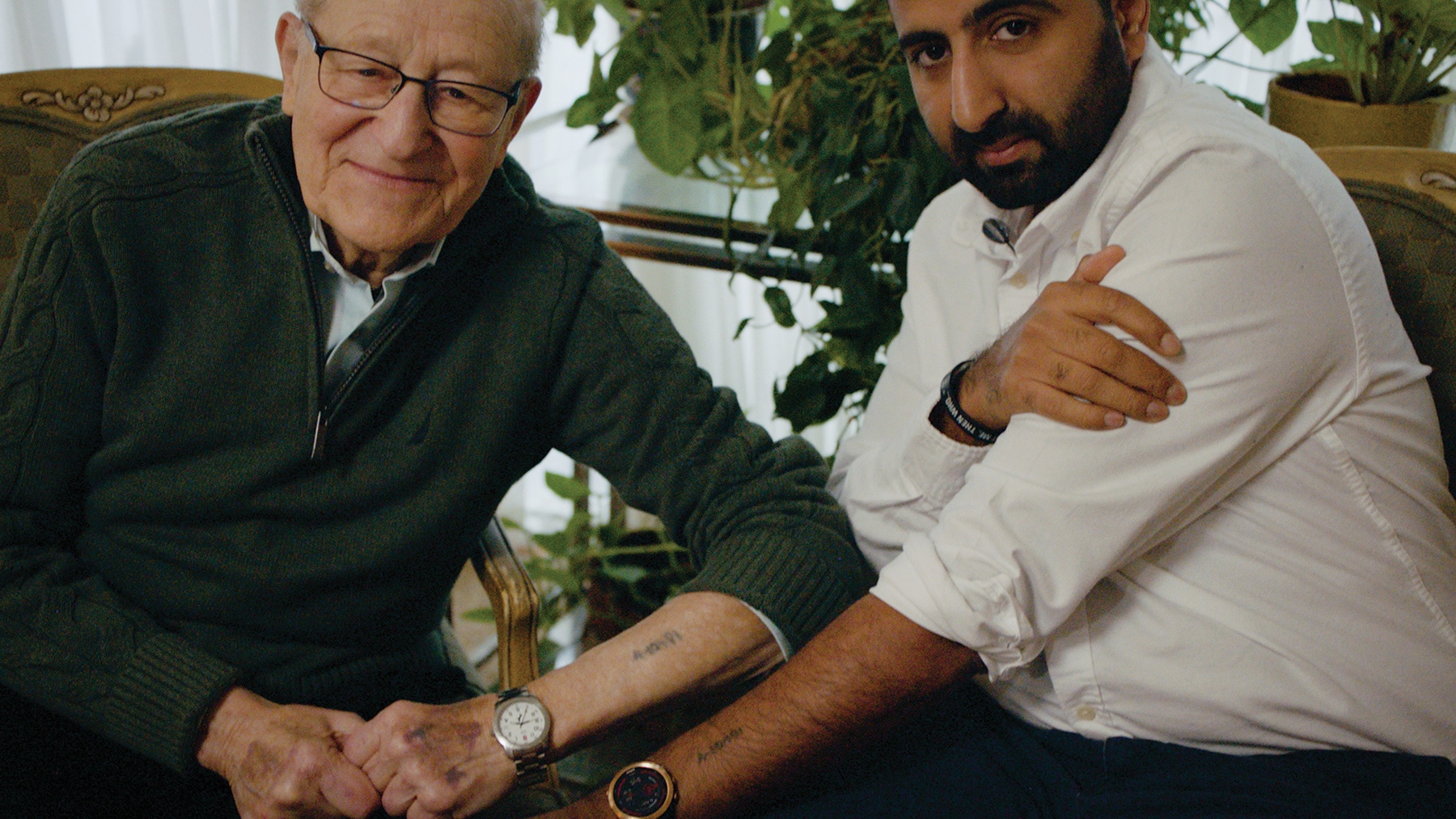 Irving Roth and Kasim Hafeez
Irving Roth and Kasim Hafeez Ninety-one-year old Holocaust survivor Irving Roth and 36-year-old former radical Islamist Kasim Hafeez are now close friends. After Hafeez noticed the concentration camp number on Roth’s forearm, he had it imprinted on his own arm as a sign of solidarity.
The story of the two men, told against a background of historical and current global anti-Semitism, is the focus of the documentary “Never Again?” It was produced and financed by Christians United for Israel (CUFI), which counts 9 million adherents and bills itself as the largest pro-Israel organization in the United States.
At first blush, the opening storyline strains credulity. However, after speaking with Hafeez and writer-producer Rick Eldrige, the story holds up.
Roth was born in small Slovakian town. He witnessed Hitler’s invading army and at 14 he was transported to the Buchenwald concentration camp. Toward the end of World War II, weighing 75 pounds, he survived a death march during which his brother died.
Hafeez was born in Nottingham in England’s East Midlands, home to a large population of Muslim immigrants, including his father, who emigrated from Pakistan. As a youngster, Hafeez was formally taught the Quran and informally instructed that Jews, especially Israeli Jews, were evil and his permanent enemies.
“I had to make a choice and do what is right. When people attack a synagogue, you have to condemn it.” — Kasim Hafeez
However, Hafeez had a restless curiosity and an inquiring mind, and he decided to learn more about these loathsome Jews firsthand. To that end, he got hold of a copy of the 2003 book “The Case for Israel,” by Harvard law professor Alan Dershowitz.
Hafeez then decided to visit Israel and in 2007 landed at Ben Gurion Airport, where security questioned him for eight hours before admitting him into the country. Since that first encounter, Hafeez said he has now visited Israel “15 to 20 times” and has become a familiar figure at the airport.
However, he has not become a blind admirer of the Jewish state. “Israel is not a utopian country,” Hafeez told the Journal. But he believes in its future — an attitude that has led to fractured relations with his family and former friends.
“I had to make a choice and do what is right,” he said. “When people attack a synagogue, you have to condemn it.”
When skeptics ask Hafeez how much the Israeli government pays him for his new attitude, he responds dryly, “Not enough.”
Eventually, Hafeez was approached by CUFI and started addressing its membership and other civic groups. On one occasion, he was introduced to the late renowned American biographer Irving Stone. It was through CUFI that Hafeez met Roth. They bonded and appeared as joint speakers, with Roth embodying the constant warning that if men and women of all faiths do not stand against unbridled anti-Semitism, the end result could be another Auschwitz.
That message is reinforced in the film via a series of meetings, arranged by CUFI, in which Hafeez interviews a lineup of Jewish luminaries, among them former British Chief Rabbi Jonathan Sacks; historian and Emory University professor Deborah Lipstadt, an authority on the Holocaust; and Israeli diplomats Michael Oren and Ron Dermer.
“[CUFI] members are Christians who might not sit in the same church pews together, but we are open to anyone who believes in a strong U.S.-Israel relationship.” — Shari Dollinger
Eldridge, the film’s producer and co-writer, is a devout American Protestant. Initially, he too had a hard time believing that Hafeez could become a friend and admirer of the Jews. However, while shooting the film over a six-month period in six countries, Eldridge said, “I saw the genuine relationship between the two men and became firmly convinced of Hafeez’ incredible transformation.”
CUFI may not be familiar to American Jews, but its work is worth recognizing, especially at a time when there are vicious online rants and murderous attacks on synagogues. When asked about the breakdown of CUFI’s evangelical, Protestant and Catholic members, CUFI co-executive director Shari Dollinger said, “Our members are Christians who might not sit in the same church pews together, but we are open to anyone who believes in a strong U.S.-Israel relationship. We tell American Jews, ‘You are not alone, and we have your back.’”
CUFI’s operational rationale is firmly rooted in the biblical mandate to support the people of Israel, which is recognized and reinforced by CUFI founder and Chairman Pastor John Hagee.
The organization has branches in Canada and London, and before COVID-19 annually held some 800 meetings across the United States, including one attended by 500 people during a snowstorm in North Dakota. In addition, CUFI annually organizes 20 trips to Israel, mainly for pastors and social media influencers.
“Never Again?” will screen Oct. 13 and 15 at 7 p.m. at 800 theaters across the United States. For information on participating theaters, visit the website.





















 More news and opinions than at a Shabbat dinner, right in your inbox.
More news and opinions than at a Shabbat dinner, right in your inbox.